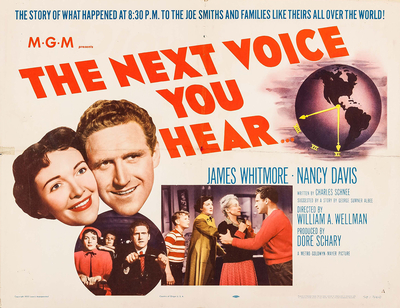While researching this column I went on Amazon looking for books about hearing the voice of God – a search that will have the site's algorithm sending me unusual, probably unwelcome, recommendations for months to come. While I found that there are really no books currently in print discussing the cultural history of the almighty's voice being heard and recognized, there are countless books helpfully telling the reader how to discern the voice of God amidst the din and distractions of modern life.
The titles are either straightforward (You Can Hear the Voice of God, Discerning the Voice of God), helpful (How to Hear the Voice of God, Hearing God's Voice Today, 15 Ways to Hear the Voice of God, Whisper: How to Hear the Voice of God) or inspirational (Guidance and the Voice of God, Hear God's Voice Everyday, Surprised by the Voice of God, The Prophetic Voice of God). Their covers share a palette of muted colours and near-abstract clip art of clouds, hazy mountains, sunsets and sunlight through trees. A cursory read suggests that they all come from a contemporary, evangelical American theological space, where the Almighty's guidance is out there to be unscrambled, like a premium cable channel or streaming service.
None of them turned out to be useful in writing about this week's movie – William Wellman's 1950 drama The Next Voice You Hear, a film about an average American family responding to the actual Voice of God taking over the global airwaves to broadcast a week of messages, to a world as unprepared to hear Him as they're in need of His notes.
The film begins with a shot of light through clouds (clearly our visual cues for God's voice haven't been updated in at least seven decades) and an onscreen quote from the Book of Samuel: "...neither was the Word of the Lord yet revealed unto him..." The scene shifts to a suburb of postwar Los Angeles, and the home of Joe Smith (James Whitmore, introduced in the credits as "Joe Smith, American"), his wife Mary (Nancy Davis, later First Lady Nancy Reagan) and their boy Johnny (Gary Gray).
As in the Book of Genesis, each of God's broadcasts are on a schedule, the first arriving on Tuesday – "The First Day," as an onscreen title informs us. The day begins with the well-worn routine of the Smith house, with Johnny getting up to do his paper route while Mary prepares breakfast and Joe struggles to overcome a workingman's morning fatigue and make his way to the kitchen table, where he and his son loudly chew through a bowl of cereal to a mixture of dismay and loving fondness from Mary.
After fighting to start his old car, Joe barrels out of his driveway and into the street, racing to deliver Johnny to school and get to his job at the Ajax Aircraft plant – filmed at the Douglas factory in Santa Monica, with DC-3s and DC-6s parked on the adjacent runway. The Smiths might be living at the dawn of the Cold War, but the only enemy they seem to be fighting is routine.
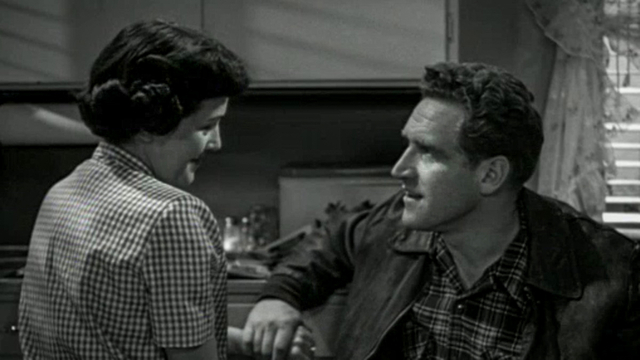
It's a fond and familiar portrait of the American family in their tract housing habitat, in the very early days of the postwar economic boom. Father and son are virtual clones of each other, down to the bomber jacket Johnny sports, patterned after his veteran dad's war surplus wardrobe. The only discernible variation is that Mary is visibly pregnant, and a week from her due date – an interval that's significant if you know what's coming.
Wellman's film would be a lot more obscure if Dore Schary, the renowned MGM producer who oversaw it, hadn't written a whole book about its making – A Case History of a Movie, published by Random House the year of its release. It's a fantastic artifact – a painstaking document of movie production just after the zenith of the studio system, when the lavish budgets that were once commonplace at Hollywood's biggest studio were gradually shrinking, and producers like Schary were forced to focus more intensely on the bottom line.
The movie began as a short story written by George Sumner Albee and published in Cosmopolitan magazine (then known as Hearst's International combined with Cosmopolitan) in 1948, when the magazine, pre-Helen Gurley Brown, was still a literary publication targeted at women. As Schary recalls in his book, Albee got the idea for his story at lunch with a doctor friend, when the writer observed "You know, wouldn't it be something of God would come on the radio and give people such a bad scare that they'd wake up and behave themselves!"
When adapting the story with screenwriter Charles Schnee, Schary knew that his budget wouldn't stretch to cover the miraculous and catastrophic events in the Albee story such as (if I read it correctly) the sinking of Australia. The story was tightened up to centre on the Smith family and their response to God's sudden and unexpected broadcast debut.
Schnee and Wellman set their scene carefully. There might be nearly two decades of economic prosperity just over the horizon, but like most working Americans, the Smiths are tightly pressed between Joe's paycheque and Mary's budget. Joe and his crew are at the mercy of their supervisor, Mr. Brannan (character stalwart Art Smith, last seen in this column as Humphrey Bogart's much-abused agent in In A Lonely Place), who calls them loafers and layabouts while they loaf around the locker room complaining about him. Joe in particular resents the humourless Brannan, whose job he's sure he'll have if only the older man would retire.
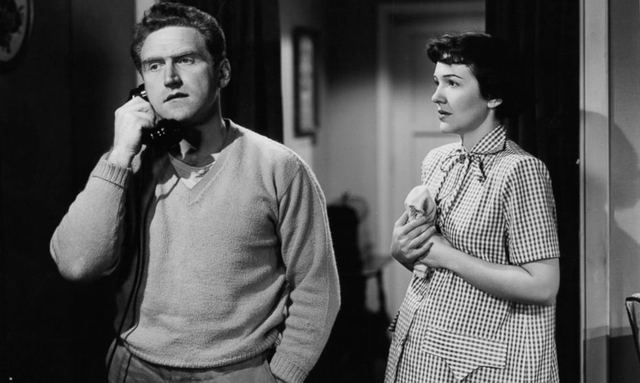
His car is old, their furnishings are well-worn, their ice box breaks, and the voice of God arrives in their household through a big console radio – one of those vaguely streamlined antiques, decorated with thin veneers of ornamental wood that Joe and Mary probably bought used or acquired from a more prosperous relative at the start of their marriage, before the war.
While his wife helps their son with his homework, Joe relaxes in the living room with a glass of beer, settling in for a live music program when the camera cuts to Johnny's bedroom. Joe wanders in with a troubled expression; Mary asks him why he isn't listening to the radio – clearly his after-dinner routine is as predictable as their breakfast one – but Joe tells her that, instead of music, there was "kind of an odd, empty sound," and then a voice saying "This is God. I will be with you for the next few days."
Schary notes in his book that the next few moments are critical for the audience and the rest of the picture:
"Joe's attitude would be puzzled. Also he'd be ninety-nine percent skeptical about the voice being God's – but that one percent race would be enough to plant the fear which must start to grow tomorrow. Young Johnny is skeptical and 'So what?' Mary, too, is puzzled. But there is a little more stirring of fear deep within her – which she smother's under her instinctive woman's reaction, 'Keep the home going.' The over-all mood of the scene would be subdued, and the two adults would underplay."
Mary keeps wondering if it's "one of those Orson Welles things." Johnny suspects his friend Eddie Boyle, who's always messing around with his ham radio. This prompts my favorite lines in the picture:
Joe: Well, if that isn't the silliest...Would Eddie Boyle's voice sound like God"
Johnny: I don't know. I never heard God.
Mary: That's not very nice, Johnny. Go to bed.
It was important for Schary, Wellman and Schnee that we never actually hear the voice of God – his broadcasts happen offscreen, or before a scene, to be read back by Mary or Joe or by radio presenters quoting transcriptions. (It has to be noted that TV plays no part in these divine pronouncements; 1950 was probably the last possible moment when Hollywood could blithely ignore television.) Just as nobody can discover where the broadcasts are coming from – or why they're heard in the language of listeners all over the world – all attempts to record them are unsuccessful.
A less tasteful director might have happily given God's voice screen time – Cecil B. DeMille would do it twice in his 1956 Technicolor remake of his silent classic The Ten Commandments, , with Charlton Heston doing double duty as Moses and God's voice, and Rex Ingram had played "De Lawd" in Green Pastures (1936) – but Wellman and Schary were tasteful, sophisticated men, who knew that the slightest failure in tone or presentation would be fatal to the story, never mind how it might clash with or offend the religious sensibilities of their audience.
Those sensibilities – so difficult to predict, especially in non-Christian parts of the globe – were already a problem for Schary before the cameras rolled, when MGM's London office informed him that conceptions of the sacred in the UK (at least at the beginning of the '50s) were far more rigid than the somewhat Episcopalian theology that infuses The Next Voice You Hear:
"In justice, it must be admitted that the whole tempo of British life is on a more formal basis than ours, and the informal, intimate acceptance by Joe and Mary and Johnny of God as a part of everyday life and conversation seemed to them sacrilegious...there would be no hope of compromise through 'protection' shots, because the objection went to the core of the whole story, the characters, the theme, and the atmosphere."
Confronted with this knowledge, Schary went ahead with production knowing that he and MGM would have to write off returns from British cinemas (usually the full profit after costs in an MGM picture at the time), and rely on the American market alone for The Next Voice You Hear.
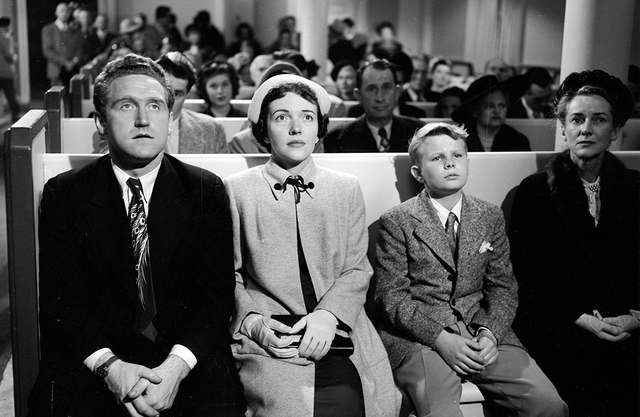
Fear grows with each of God's broadcasts, both among the Smith's neighbours and co-workers and in their family, even as it's officially determined that the signal can't possibly be of conventional, earthly origin – a verdict by the experts that the general public seems to accept without question.
For the Smiths that fear centers on Mary's pregnancy; after a false labour scare, Joe and Johnny worry that Mary might not survive childbirth; it's one thing to have doubts about a God that allows tragedies to happen to blameless people, but it's another thing to know with certainty that God exists. In the meantime, Mary's chatty, devout, busybody Aunt Ethel (Lillian Bronson) hysterically proclaims that everything – Mary's medical state, God's sudden vocal appearance – is a judgment on them all as sinners.
Today, we've long overcome any reticence about giving God a speaking part in films; since the '70s, he's been played by everyone from George Burns, Morgan Freeman and Rodney Dangerfield to Alanis Morissette, Whoopi Goldberg and Rob Zombie. Freeman in particular has become the default choice as God's voice; if they remade The Next Voice You Hear today, he'd get the role.
Culture and society are far more secular today, and so we're free to imagine God as a more whimsical, satirical, even comic character, His appearance as likely to inspire resentment as terror or unease. Which isn't to say that we can't imagine society reacting with fear and hysteria when faced with an unexpected visitor from the skies.
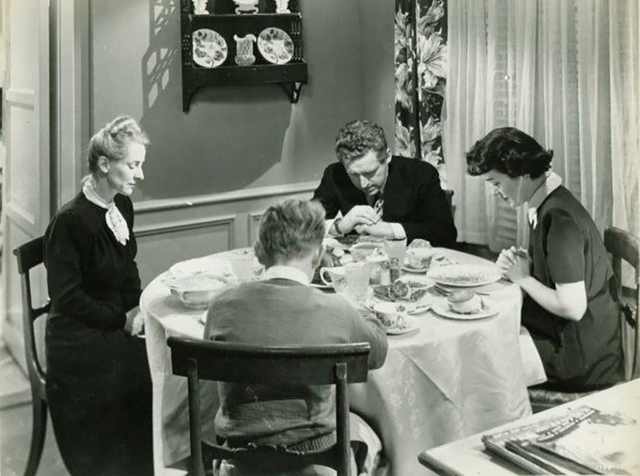
Movies about alien contact with our civilization are rife with depictions of society succumbing to fear and panic, from comedies like Mars Attacks to action epics like Independence Day (both notably released in the same year: 1996) to sci-fi dramas like Contact (1997). Perhaps the best picture about alien first contact triggering a worldwide spiritual crisis is Denis Villeneuve's Arrival (2016), where the sudden arrival of alien craft causes much of the world around Amy Adams, the film's protagonist, to fall into an apparently global depression, with a rise in suicides and outbreaks of riots and looting. (Though to be fair, there's always a small but active part of the population primed to loot and riot no matter the justification.)
America in 1950 was a more explicitly religious society; religious attendance in the US actually rose from the start of WW2 to the end of the decade, reaching a high of over 50% in 1960 among those aged 30-59. Interestingly, numbers were lower for young people and senior citizens, and the only self-described atheist in The Next Voice You Hear is Joe's boss, Mr. Brannan, who challenges the God that Joe has suddenly come to fear to do his bidding and strike the older man down, if Joe is so desperate to take his job.
A sourness and shame and fear of death overtakes nearly everyone around Joe by the middle of God's week of messages, especially after a sudden storm rises just after a broadcast where God talks about miracles and signs; the Smiths are overcome with terror at the lightning and thunder, with Davis letting out a particularly convincing scream.
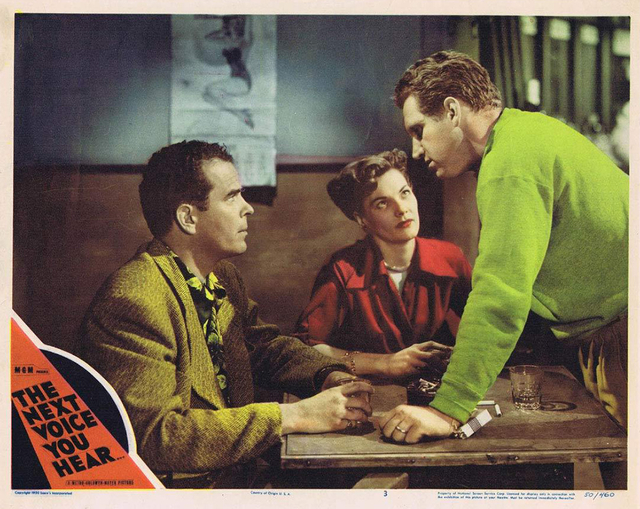
After arguing with his wife, Joe tells her he's going out for cigarettes as an excuse to get away from home; he ends up in a seedy bar where he runs into Mitch (Douglas Kennedy), an old friend from his single days, now a merchant seaman home with a pocket full of money. He buys enough rounds to get Joe drunk, and a woman watching them from the bar joins them at their table, looking for a good time. Wellman, worried about cutting costs on extras, told Schary that the bar should be empty:
"'What are all these background people going to be doing in the saloon?' asked Wellman. 'Take them out; now that God's on the radio nobody's going to the saloons and there's just this one girl sitting at the long shadowy bar, it'll be a wonderful lonesome feeling.'"
Mitch, a detestable loudmouth blowhard, tells his friend that he's "the most married guy I've ever seen" and tries to get him to join him on a bender. But Joe's shame can't be drowned in shots, and he tells him that "I shouldn't be here with you, Mitch – you're the voice of evil."
The bars are empty but the churches are full by the end of the week, and after seeing his father drunk, Johnny runs away from home. Ironically, the film's atheist is pivotal in reconciling father and son, and Joe finds Johnny working on an airplane model in the garage workshop of Mr. Brennan – apparently they'd become friends on the boy's paper route, and the old man explains that, unlike his father, the boy wasn't afraid of Joe's boss.
Father and son are finally able to talk about what's been driving them apart; Whitmore delivers a line that would probably play well in a modern remake of the picture, targeted for a "spiritual but not religious" audience, telling his son that "We must never be afraid of God, because God is the whole world."
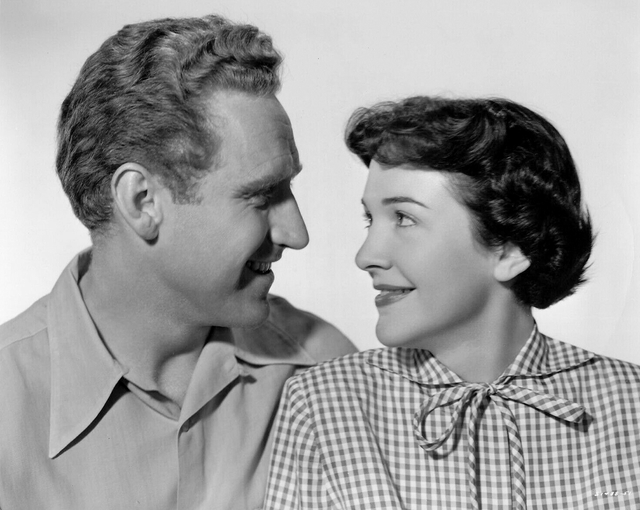
It's interesting to read Schary repeatedly refer to Whitmore and Davis as "youngsters" and "these two superb young people." Davis, a stage-trained actress and twenty-nine during filming, was never really an ingénue, while Whitmore, born the same year as Davis and a Marine veteran at Tinian and Saipan, was one of those actors, like Walter Matthau, that seemed to have been born old.
Before teenagers became a booming demographic, youth meant not middle-aged, and was undiminished by full-time employment, home ownership or even parenthood. Taken alongside the film's assumption of general religious belief, this makes The Next Voice You Hear a real cultural artifact, forever trapped on the far side of a watershed historical moment.
At the end of the movie everyone congregates in churches and temples and around their radios, waiting to hear the final message, but while God rests on the seventh day, Mary goes into labour and give birth do a daughter. At the end of filming, Schary oversaw the final edits, and despite lingering worries that "'message' pictures drive people away from the theatres, and religion is poison at the box-office," saw test audiences laugh and applaud everywhere they were supposed to, and even write comments on opinion cards distributed after screenings like "Why don't you make more pictures like this?" Over seventy years later, people are still asking that question.
Mark Steyn Club members can let Rick know what they think by logging in and sharing in the comments below, as access to the comments section is one of many benefits that comes along with membership in the Mark Steyn Club.


